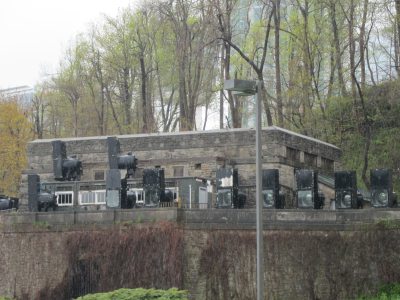Lighting the Falls

|
HISTORY
OF THE ILLUMINATION OF NIAGARA FALLS
Lighting
the Falls to allow visitors to enjoy the beauty of the mighty Niagara even at
night, was first attempted more than 140 years ago. In 1860, a spectacular
illumination of the Falls celebrated a visit by the Prince of Wales. About 200
coloured and white calcium, volcanic and torpedo lights were placed along the
banks above and below the American Falls, on the road down the bank of the
Canadian side of the gorge and behind the water of the Horseshoe Falls. The
lights were called Bengal lights and were the kind used at sea to signal for
help or give warning. The
lights were ignited along with rockets, spinning wheels and other fireworks,
creating an effect that the London Times called “grand, magical and brilliant
beyond all power of words to portray”… the likes of which the Prince would
“probably never see again”. Illumination
of the Falls using electricity first occurred in January 1879, during a visit by
the Marquis of Lorne, Governor-General of Canada and his wife Princess Louise.
The lights had an illumination power of 32,000 candles, just a fraction of the
intensity used today. A 36-horsepower generating station in Prospect Park, Niagara Falls, New York, operated in July 1879 with 16 open arc lamps each projecting 2,000 candlepower. The Niagara Falls New York Gazette reported “On the evening of the Fourth, the Park was crowded with visitors and citizens and a very satisfactory exhibition of the new light was given.” The lights were used for only one season.


Large
crowds were drawn to the Falls in 1901 for special lighting that was set up as
part of the Pan American Exposition being held in Buffalo. In 1907, W. D’Arcy Ryan of the General Electric Company designed lighting that provided far more power than ever before. Thirty-six projectors illuminated the Falls with a combined candlepower of 1,115,000,000. The display ran for several weeks.
 For
more than a decade after that, different attempts were made to raise financing
to install permanent lighting. Some efforts were prevented by the First World
War, but in 1925, a group of interested businessmen finally created the Niagara
Falls Illumination Board, to finance, operate and maintain a new, permanent
illumination system. Today’s contributing members are the City of Niagara Falls,
New York, the City of Niagara Falls, Ontario, New York State Office of Parks,
Recreation and Historic Preservation, Ontario Power Generation and The Niagara
Parks Commission. The Board’s first installation in 1925 was twenty-four carbon searchlights each 26 inches in diameter, emitting a total of 1,320,000,000 candlepower. The Falls have been illuminated most nights since that time ~ except during World War II when the lights were turned off to conserve power and during subsequent years when generating facilities could not keep pace with electrical requirements of the construction boom. It was not until January 1950 that the Illumination Board was able to guarantee enough power to operate the lights on a regular basis.
 
In
1997 and 1998, new fixtures replaced the outdated lamps and fixtures at the
Illumination Tower, doubling the intensity of the lights on the Falls without
doubling the hydro bills. Currently a total of twenty-one xenon lights, each
with a 30 inch diameter, are used to illuminate the Falls in a rainbow of
colours. Eighteen are located at the Illumination Tower, beside the Queen
Victoria Place and three are located below street level in the gorge opposite
the American Falls. Each of the xenon spotlights produces more than 390 million
peak beam and has a brilliance of 250 million candlepower. The
Falls are illuminated nightly until 10 p.m. January through April, and until
midnight the rest of the year. In recent years the only occasion the Falls were
in darkness was for a few evenings in August 2003 when the lights were turned
off to support recovery efforts during a major North American black
out.
 ALL IN ALL VERY SPECIAL TO SEE
SOFT AND BEAUTIFUL
COLOURS
|

